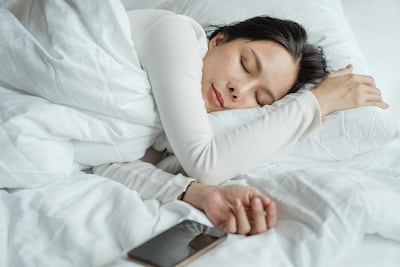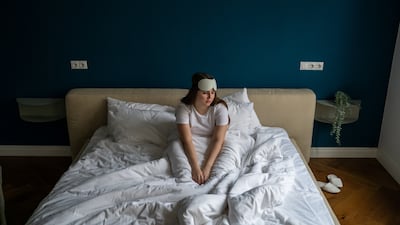As summer temperatures continue to climb in the UAE, a good night’s rest often becomes one of the first things to go. High night-time heat disrupts the body’s natural cooling process, making it harder to fall asleep, stay asleep and reach the deep, restorative stages of slumber.
Instead of drifting off, many find themselves tossing, turning and waking up feeling groggy – proof that when the nights are hot, the quality of rest takes a hit.
Why sleep matters so much
“The two basic physiological processes of life are sleep and wakefulness,” Dr Stefna Sha, neurology specialist at Aster Clinic, Bur Dubai, tells The National. “This explains why we humans spend around one-third of our lives sleeping. Yet despite its biological importance, modern society is chronically sleep deprived.”
She describes sleep as “the greatest biological mystery of all time” and says its functions extend far beyond rest.
“The main functions of sleep are immune regulation (helps you fight diseases), glucose tolerance (helps you fight diabetes), balance of hormonal levels (important to prevent diabetes, obesity, hypertension), gene expression, improvement of brain function (helps protect yourselves from dementia), thermoregulation and memory consolidation; in fact, sleep can rescue memories that are lost during wakefulness in daytime.”

According to the Mayo Clinic, adults should aim for at least seven hours of rest per night, while teenagers between 13 and 18 need eight to 10. Yet a December 2024 study, Sleep Deprivation and Its Association with Physical and Mental Health Among Adults in the UAE, published in Europe PMC, found that more than 40 per cent of UAE adults report either not getting the recommended amount of rest or experiencing poor-quality sleep, even when the hours suffice.
How heat makes it worse
In the UAE, summer nights are hot and humid, conditions that can interfere with the body’s natural ability to cool down before bed.
“Temperature plays a crucial role in sleep quality,” says Dr Sha. “High core body temperature reduces both REM and NREM sleep. For each 10ºC rise in temperature, total sleep duration decreased by 9.67 minutes. Summer heat elevates body temperature, often reducing sleep quality. High humidity makes cooling harder and degrades sleep.”
This challenge isn’t unique to the UAE, but local data shows how noticeable it is. Eight Sleep, a sleep technology company from the US, tracks behaviour across more than 30 global markets through its temperature-regulating Sleep Pod system, which adjusts cooling through the night.
“Our user data shows that UAE residents are among the top 10 globally who consistently set their Pod to the coldest temperature settings,” says Matteo Franceschetti, the company’s co-founder and chief executive.

“This isn’t surprising given the region’s extreme climate, with record-breaking summer temperatures and high overnight heat that lingers well past sunset. While AC is common, it doesn’t always deliver the precise, body-level cooling required for deep, uninterrupted sleep.”
The company’s findings also show that temperature (36 per cent), stress (48 per cent) and irregular schedules (32 per cent) are among the top disruptors for UAE residents. “Across our 30-plus global markets, the UAE ranks in the bottom 25 per cent for total sleep duration and quality, underscoring sleep as a widespread issue residents face,” Franceschetti adds.
The consequences of chronic rest loss
Dr Sha warns that insufficient, poor-quality rest “can silently wreak havoc on the body and mind".
Chronic lack of sleep, she says, is associated with an increased risk of diabetes, hypertension, obesity and dementia. “Poor motivation, memory lapses and frequent microsleeps can lead to impaired academic and work performance,” she adds. “Migraine, particularly worsened in summer due to high temperatures, disrupts sleep further.”
neuropsychiatrist, Thrive Wellbeing Centre
The most common symptom of poor sleep, she explains, is excessive daytime sleepiness. “It can also include depressed mood, poor focus, impaired memory, as well as impairment of executive functions.”
Dr Ash Shishodia, a neuropsychiatrist at Thrive Wellbeing Centre, adds that the emotional effects of heat-related sleep loss can be just as damaging.
A 2019 study in Sleep Health found that hot nighttime temperatures correlated with worse mood and increased mental health complaints, while a 2022 study in PLOS Medicine linked hotter nights to a rise in self-reported mental distress, especially among younger and lower-income groups.
“Disrupted sleep from heat can lead to heightened anxiety, irritability and depressive symptoms, both in the short term and cumulatively over time,” he says. “Poor sleep doesn’t just make you tired, it directly alters brain function and emotional processing.”
He adds that heat worsens the body’s stress response. “Overheating activates the sympathetic nervous system, the same system involved in fight-or-flight reactions. This leads to increased heart rate, rapid breathing and muscle tension, which the brain can misinterpret as emotional stress or danger.”
Practical ways to sleep better in the heat
Eight Sleep's Franceschetti notes that while some high-end solutions can help, he realises that not everyone has access to them. “Even without advanced sleep tech, there are simple, science-backed steps people can take to improve sleep quality in hot climates,” he says.
Dr Sha recommends a combination of lifestyle and environmental adjustments
Maintain a consistent sleep schedule: Go to bed and wake up at the same time each day to reinforce your body’s natural rhythm.
Create an optimal sleep environment: Keep the room cool, ideally between 18-21°C, and dark. Use AC or cooling fans, but avoid direct airflow on the body. “If the AC has a timer, use it to slowly increase the temperature throughout the night,” she says, to mimic the body’s natural temperature changes.
Choose breathable fabrics: Sleep with light, moisture-wicking bedding and avoid heavy layering. “Warming feet in young and chest in elderly can help you sleep faster; however, keep the temperature of the rest of the body low,” says Dr Sha.
Take a warm bath before bed: A warm bath a while before heading to bed can trigger heat release and help lower core temperature.

Reduce stimulants and screen exposure: Avoid caffeine, alcohol, tobacco and blue light from devices before bed.
Exercise lightly: Light afternoon exercise can promote better rest.
Stay hydrated: “Stay well hydrated in daytime,” Dr Sha says, but avoid drinking excessive amounts right before bed.
Franceschetti adds that small changes to how heat is managed at the mattress level can also make a big difference, building on Dr Sha’s advice about keeping the room cool.
“Most people think staying cool is about lowering the room temperature, but what really matters is how heat builds up where your body meets the bed," he says. "That’s the layer of the sleep environment that impacts core body temperature the most and it’s where the right kind of cooling can make the biggest difference.”
Calm the mind, not just the body
Christi Gadd, psychologist at Thrive Wellbeing Centre, says that changing the mindset towards hot, sleepless nights can also make a difference.
“One of the most effective tools is psychological acceptance,” she says. “That doesn’t mean enjoying the discomfort, but rather not fighting it emotionally. When we resist reality – wishing it were cooler, resenting the heat – we only add secondary suffering on top of the physical discomfort.”
She suggests techniques such as mindfulness body scans, breathwork (such as slow nasal breathing) and cooling visualisation – imagining yourself in a cold, calming environment – to reduce frustration and help the body downshift. Replacing thoughts such as “I’ll be useless tomorrow” with “it’s just one rough night, I can rest when I need to” can also help ease the pressure to sleep perfectly.
Ultimately, Dr Sha says, prioritising sleep hygiene – especially in today’s overworked and overstimulated world – is essential to avoid short-term burnout and long-term illness. “Sleep is in fact, your body’s most powerful healer,” she says.






